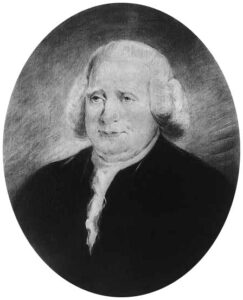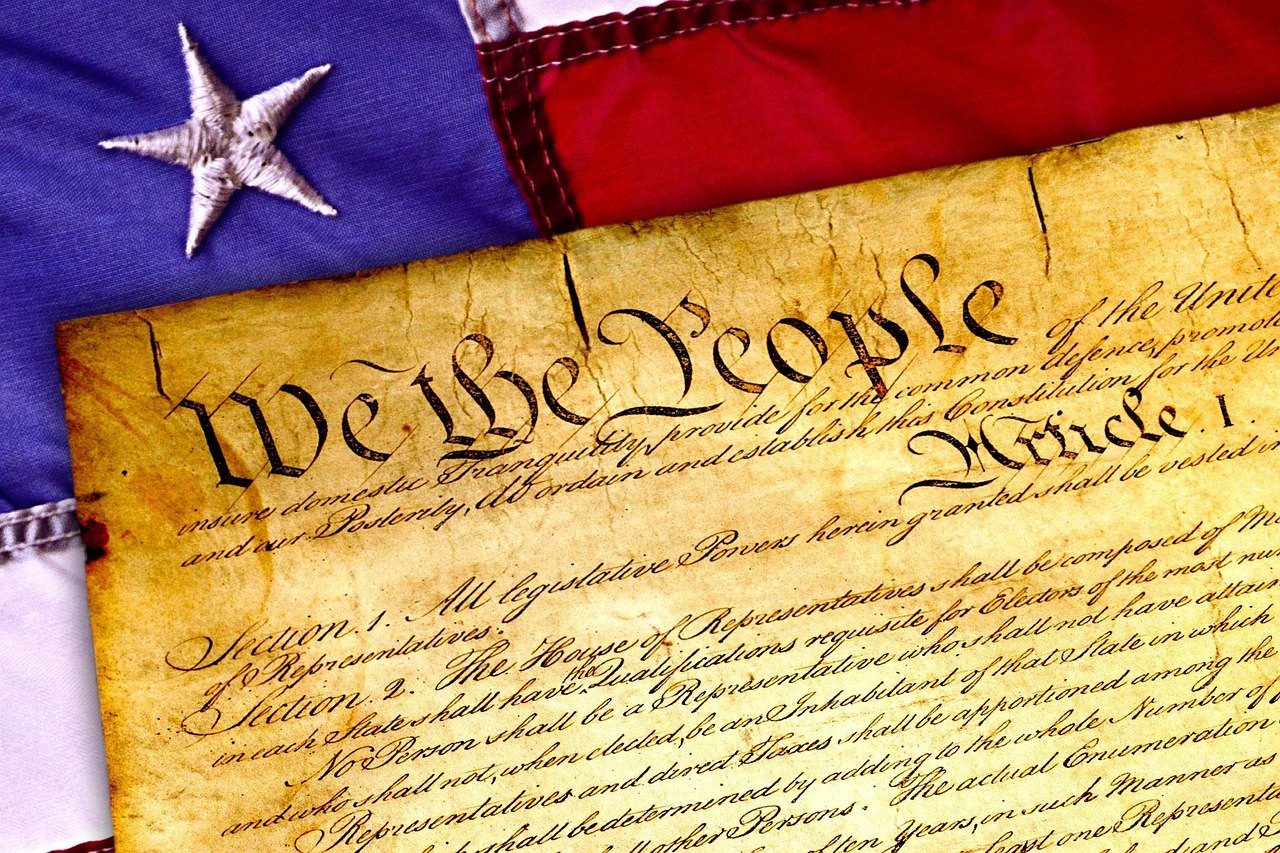
Carter Braxton was a signer of the Declaration of Independence who had initially opposed it because he felt it was premature. He was a very wealthy merchant, planter, and Virginia politician, who like Robert Morris, contributed great sums to the Revolutionary cause. His generosity coupled with destruction of much of his property by the British, and later poor financial decisions resulted in the loss of much of his wealth. Braxton was hesitant but became a Revolutionary that was committed to the “Glorious Cause.” He was a patriot and an American hero.
Carter was born on 10 September 1736 at Newington Plantation in King and Queen County, Virginia. He was the son of George Braxton, Jr. And Mary Carter. Mary died shortly after Carter’s birth. She was the youngest daughter of Robert “King” Carter who was probably the wealthiest man and largest landowner in Virginia. His paternal grandfather, George Braxton, Sr. was one of the largest landowners in Virginia’s Northern Neck. George Sr. Was also a member of the Virginia House of Burgesses.
Carter Braxton’s father died in 1749 when Carter was 13 years old. He and his brother, George, became wards of John Robinson, Jr. And Humphrey Hill. George was the oldest son, so he inherited Newington and lands in King and Queen and Essex counties.
The Braxton boys grew up in the lap of luxury. Both were educated at the prestigious College of William and Mary. Carter graduated in 1755 and married Judith Robinson, a wealthy heiress. The couple lived at Elsing Green Plantation (still a working farm) in King William County. Judith died two years later during childbirth leaving Carter with two young daughters, Mary, and Judith.
After Judith’s death Carter traveled to England. He returned to the Colonies in 1760 and sold Elsing Green Plantation. On 15 May 1760 he married Elizabeth Corbin the eldest daughter of Richard Corbin, Deputy Receiver General for his Majesty’s Revenues in Virginia. Elizabeth brought a dowry of 1,000 pounds sterling. Although I could not find a firm number, the couple had at least 16 children.
Once home and remarried, Carter Braxton turned his attention to business and bought a small schooner for trade in the West Indies and the colonies. This was the first of an eventual large merchant fleet he would build. Through trade he developed working and personal relationships with Bayard & Son of New York and Willing & Morris (Robert Morris) of Philadelphia and others.
Following family tradition, Carter also began a political career by representing King William County in the Virginia House of Burgesses beginning in 1761. Although Carter Braxton remained quite wealthy, he suffered a financial setback in October of 1761 when his brother George died. George left an insolvent estate which resulted in the loss of Newington Plantation.
Carter Braxton and his family were closely associated politically and personally with John Robinson, Speaker of the House of Burgesses, and Colony Treasurer. When Robinson died in 1766 a major financial scandal (John Robinson Estate Scandal) became public. Robinson had used paper script that he was supposed to destroy and tax revenues to make interest free loans to friends and supporters, and to pay his own debts. Most of the aristocratic people lived well beyond their means. It turned out that the Braxtons had been among the largest recipients of these loans and had profited considerably. Little money was ever recovered, largely because most of the investigators had been recipients of the illicit loans.
In addition to his duties as a burgess, Carter served as sheriff of King William County (a lucrative position), colonel of the county’s militia, and vestryman of St. John’s Church which was close to his new home of Chericoke Plantation.
Braxton was considered to be politically moderate or conservative. He supported official protests against new British punitive taxes and other acts of Parliament but did not support boycotts or protests like the Boston Tea Party. However, in 1774 Braxton became the King William County delegate to the Fourth Virginia Association which authorized local committees of safety and volunteer militia units in reaction to British efforts to tighten their rule.
When Virginia’s Colonial Governor Lord Dunmore seized Virginia’s gunpowder and other ordnance, Braxton helped negotiate a compromise between Patrick Henry and the Crown’s representative, Richard Corbin (his father-in-law). This compromise averted a serious military confrontation between the British and Virginia Militia.
Braxton gradually became more involved in revolutionary politics so when Peyton Randolph died in Philadelphia in October 1775 Braxton was selected to replace him in the Continental Congress. Braxton only served until August 1776 when Virginia reduced the size of their delegation. He signed the Declaration of Independence although previously in the Committee of the Whole he opposed it as premature. He also earned criticism from hardline revolutionaries for a politically conservative pamphlet, “Address to the Convention,” he published in response to the proposals of firebrand John Adams in “Thoughts on Government.”
After leaving Philadelphia, Braxton returned to the Virginia House of Burgesses. He was not reelected so he missed the 1778 sessions. Chericoke Plantation burned down shortly before Christmas 1776, forcing the Braxton family to move to Grove House near West Point, Virginia

During the War for Independence Braxton, like Robert Morris, expended much of his fortune to support the war effort. He funded shipping and privateering (losing about half of his 14 ships). He, Morris, and Benjamin Harrison sold American products to raise funds for weapons, other ordnance, food, and clothing. In 1777 one of his privateers unfortunately seized a neutral Portuguese vessel which earned him congressional rebukes, and considerable legal costs. In addition, the British destroyed some of his plantations. Braxton had “pledged” his “fortune” and actually paid the price.
Braxton’s poor agricultural business practices, indebtedness incurred after the deaths of his father and brother, and expenditures during the war resulted in financial problems. Creditors began to hound him, and he sued Robert Morris for unpaid loans. He did not recover any funds from Morris who was forced into bankruptcy and served time in Debtor’s Prison.
The financial problems resulted in the sale of one Braxton plantation in 1785, and a move to a smaller residence in Richmond. He paid for the new home with depreciated paper currency which also allowed him to repay the Robinson estate loan.
Obviously, Braxton had suffered significant financial setbacks, but he was still a very wealthy man. At the end of the war, he owned at least 12,000 acres. In 1791 he purchased Strawberry Hill near Richmond for his wife. Six years after the war he owned 8,500 acres which still made him one of the 100 largest landowners in Virginia. At his death, he owned 3,900 acres.
Carter Braxton died on 10 October 1797 at his home in Richmond. He had suffered at least two strokes in his final years. Braxton’s political service had spanned 36 years. The House of Burgesses, 1761-1771 and 1775-1776; Continental Congress 1776; Virginia House of Delegates ,1776-1783, 1785-1786; and Virginia Council of State 1786-1791 and 1794 until his death. During his career he had several feuds with those he disagreed with, including John Adams, the Lee family and Patrick Henry.

It is believed that Carter was buried at Chericoke, which is still owned by the Braxton family. Chericoke had been rebuilt by Braxton after it burned in 1776 and was given to his son George on his marriage to Mary Walker Carter (daughter of Charles Carter of Shirley) in 1781. Possession of Chericoke survived despite the persistent legal attacks by creditors. Nearby Elsing Green is now open to tourists.
In 1910 Braxton family graves were moved to Hollywood Cemetery in Richmond, but Carter Braxton’s remains could not be located. A monument was erected at the cemetery for him anyway. Braxton County (now West Virginia) was named for him, and a World War II Liberty Ship carried his name.
Carter Braxton was very wealthy and enjoyed all the benefits of his wealth and station in life. Since he was a member of the privileged aristocratic planter class who had much to lose, he was a hesitant revolutionary. He served in the Continental Congress for a brief time, but it was long enough for him to take part in the debate on independence and to sign the Declaration of Independence. He helped finance the war and much of his property was destroyed by the British. Braxton paid a high financial price for liberty and was a patriot and American hero.
